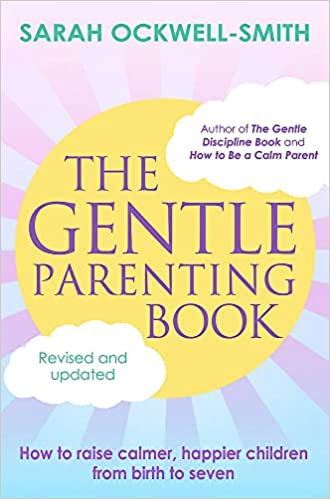In this thorough review of The Gentle Parenting Book, we delve into Sarah Ockwell-Smith’s comprehensive guide, which masterfully presents the core principles, strengths, and weaknesses of gentle parenting.
This evidence-based approach is epitomised by empathy, respect and understanding while maintaining clear boundaries. The book covers an array of topics, from managing tantrums to nurturing emotional intelligence, enhancing sleep habits and disciplining with love and respect.
Although it faces some criticisms, such as perceived bias and unacknowledged privilege, The Gentle Parenting Book remains a valuable resource for expectant parents, parents of young children, caregivers, educators, and anyone interested in child development or parenting philosophies.
This exceptional book is highlighted in our extensive guide to the best books for attachment parenting.
Table of Contents
Introduction
The Gentle Parenting Book offers a trustworthy combination of ‘what-to-expect’ information and gentle-parenting solutions to the most common challenges faced by parents with young children.
Addressing a wide variety of topics such as coping with a crying baby, introducing solid foods, creating healthy eating habits, potty training, starting nursery and school, sibling rivalry, tantrums, whining, sulking, aggressive behavior, and much more, this book aims to help parents raise emotionally healthy and well-adjusted children.
Author Sarah Ockwell-Smith bases her gentle parenting approach on current scientific research and child psychology, ensuring that her advice is practical and effective.

Pros and Cons
Pros
- Evidence-based approach.
- Comprehensive coverage of various parenting topics.
- Practical advice and strategies.
- Empathy and understanding at the core of the book.
- Easy-to-understand language.
Cons
- It may not resonate with everyone’s parenting style.
- Some topics might require further reading or resources.
- Criticisms of being too permissive or lenient.
The Gentle Parenting Book Overview and Key Concepts
The Gentle Parenting Book offers a comprehensive and detailed look into the key concepts and principles of a gentle approach to parenting. The book is divided into sections, covering pregnancy and birth, the early months, and age-specific guidance for children up to seven years old.
At its core, gentle parenting emphasizes the importance of empathy, respect, and understanding in the parent-child relationship. The book explains how parents can create secure attachments with their children, which is crucial for their emotional development and well-being.
It also highlights the significance of emotional intelligence in children, explaining how it can positively impact their communication, problem-solving, and interpersonal skills.
The book delves into various aspects of child development, such as cognitive, physical, social, and emotional growth. Ockwell-Smith also discusses the impact of external factors like media, diet, and sleep on a child’s overall well-being. She emphasizes creating a balanced, nurturing environment supporting a child’s natural development.
One of the key concepts covered in the book is the need to set healthy boundaries with children. Ockwell-Smith argues that gentle parenting does not mean being overly permissive or indulgent; instead, it’s about establishing clear and consistent limits that help children feel secure and supported.
Overall, it’s a balanced view of how you can integrate this parental style into your parenting journey. As a result, if you are looking into other parental styles, such as authoritative or attachment parenting, this book will be incredibly useful due to its focus on the emotional side of parent-child relationships.
Gentle Parenting Strategies and Practical Advice
The Gentle Parenting Book is brimming with strategies and practical advice for parents to effectively navigate various challenges they may face while raising their children. Here are some examples of the guidance provided in the book:
- Managing tantrums: Ockwell-Smith suggests staying calm and composed, acknowledging the child’s emotions, and offering comfort and support during a tantrum. She also recommends avoiding punishment and using the opportunity to teach the child appropriate ways to express their emotions during challenging behavior.
- Fostering emotional intelligence: The book provides tips for teaching children to recognize, express, and manage their emotions, as well as empathize with others. Parents are encouraged to model emotional intelligence by being open about their feelings and validating their children’s emotions.
- Improving sleep habits: Ockwell-Smith emphasizes the importance of creating a consistent bedtime routine, providing a calming sleep environment, and addressing any sleep-related fears or anxiety. She also discusses different sleep training approaches and their alignment with gentle parenting principles.
- Disciplining with love and respect: The book offers guidance on implementing discipline strategies that align with gentle parenting, such as natural consequences, time-in, and problem-solving. It also highlights the importance of avoiding harsh punishments or shaming, while setting firm boundaries.

Criticisms and Omissions
While The Gentle Parenting Book has been widely praised, some readers have expressed concerns or criticisms about certain aspects of the book. Some of these include:
- Perceived bias: Some readers have felt that the author presents her own parenting choices as the ideal without always providing a balanced argument. For example, the book’s discussions on breastfeeding and bed-sharing have been criticized for not fully addressing the potential risks or alternative perspectives.
- Unacknowledged privilege: Certain recommendations, such as hiring a nanny or relying on friends and family for childcare, may not be feasible for all families due to financial or logistical constraints. The book has been critiqued for not always acknowledging the potential limitations or barriers some families may face in implementing the suggested strategies.
- Relevance and applicability: While the book focuses on children up to seven years old, some readers have noted that much of the advice provided could also be relevant for parents of older children. Additionally, the book’s applicability may be limited in certain cultural contexts or family situations where gentle parenting principles may not be as widely accepted or practiced.
Who Should Read This Book
The Gentle Parenting Book is an ideal resource for a wide range of readers, including:
- Expectant parents or those planning to start a family. The book provides valuable information on pregnancy, birth, and the early months of a child’s life, as well as guidance on creating a nurturing and supportive environment from the very beginning.
- Parents of young children, who can benefit from the age-specific advice and strategies for addressing common challenges such as tantrums, sibling rivalry, and sleep issues. The book’s focus on children up to seven years old ensures the guidance remains relevant and applicable throughout the early years.
- Parents who are considering a transition from a more authoritarian parenting style to a gentler approach. The book provides reassurance and support for those looking to make this change, offering practical tips and insights on how to adapt their parenting techniques.
- Caregivers, educators, and other professionals who work with young children, as the book’s principles and strategies can help them better understand and support the emotional and developmental needs of the children in their care.
- Individuals interested in child development, psychology, or parenting philosophies, as The Gentle Parenting Book offers an in-depth exploration of gentle parenting principles and their potential impact on a child’s well-being and development.
This Book is a valuable resource for anyone seeking to understand and implement gentle parenting principles in their lives.
Conclusion
This review of The Gentle Parenting Book highlights the book’s strengths, including its evidence-based approach, practical advice, and focus on empathy and understanding.
Despite potential weaknesses or limitations, the book is a valuable resource for parents and caregivers seeking to raise emotionally healthy children in a supportive and nurturing environment.
As with all of our reviews, we encourage you to develop your own balanced parenting style using a combination of books that resonate with you most. Along with your own instincts and goals, of course!
By embracing the gentle approach, parents can improve their relationships with their children and contribute to a more compassionate and understanding world for future generations.
Related Book Reviews:
Review of Peaceful Parent, Happy Kids: How to Stop Yelling and Start Connecting
Book Review of Parenting from the Inside Out by Daniel J. Siegel and Mary Hartzell

